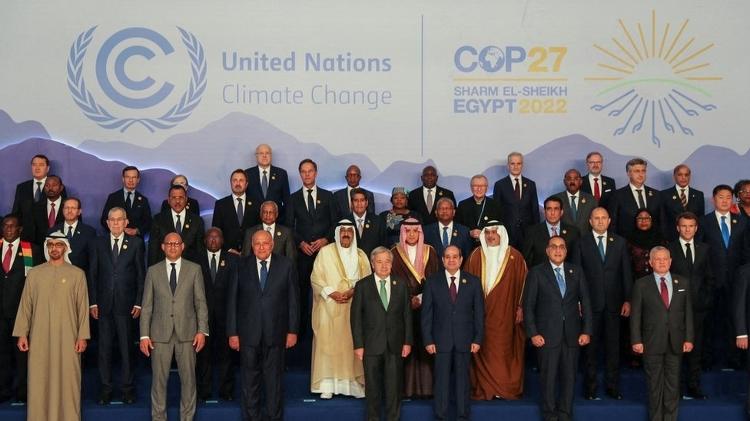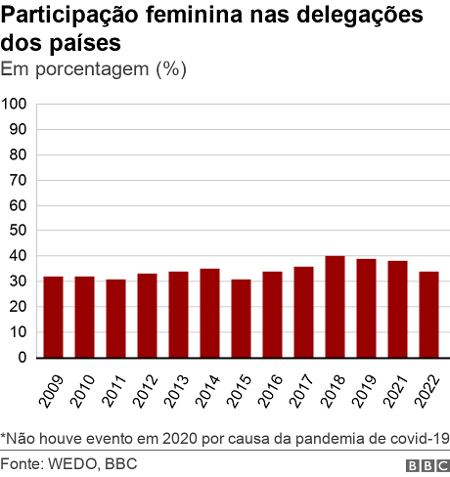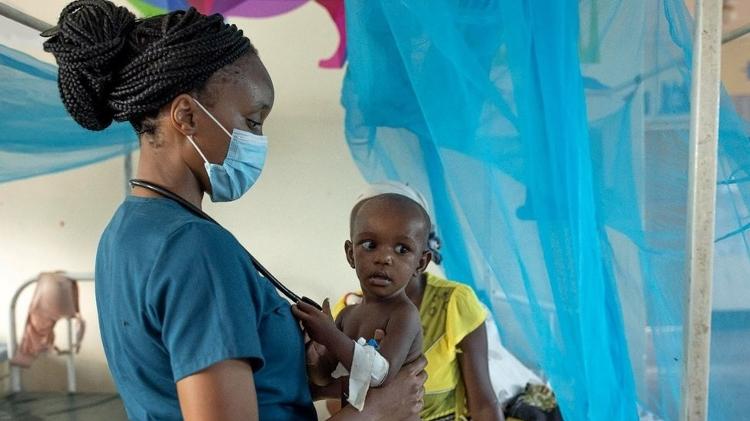Negotiations are conducted by the majority of men, despite women suffering disproportionately from the consequences of the climate crisis.
Few women participated in the climate change talks at COP27 in Egypt this week.
A BBC analysis shows that women make up less than 34% of country delegations attending the UN climate conference.
This disparity is notable given the evidence that women suffer most from the consequences of climate change on the planet.
Activists say the problem will not really be resolved without more female representation in the debates, and women’s lives will only get worse.
Brazilian Shirley Djukurna Krenak, from the Krenak people in Minas Gerais, told the BBC that women have always been warriors to defend the planet.
“Women understand what it means to live in community,” she said, and therefore know what it means to care for people and the environment. She also noted that indigenous women have always fought for greater environmental protection and their voices should be heard and respected.
Last week, world leaders gathered at COP27 to take the opening photo of the conference. There were 110 leaders, but only 10 were women.
Brazil at the COP
President Jair Bolsonaro will not attend the conference, as he did not attend the previous edition of the event. However, the delegation sent by the government to Egypt with a paid trip is the largest delegation at the conference with 570 people.
Although there are women in the Brazilian government delegation, many of them do not have an active role in the conference: they are the wives of politicians and advisers who accompany their husbands on their travels. The Brazilian delegation also includes businessmen and military police.
The lack of researchers in the official delegation and the absence of environmental NGOs, local organizations and social movements drew attention.
But the presence of Brazilians is not limited to those sent by the government. Many activists and researchers attend the event alone.
Luiz Inácio Lula da Silva, who was elected president to take office on January 1, traveled with his entourage to meet with world leaders and discuss environmental protection measures in his government.
Lula’s entourage believes that the elected MP Marina Silva, who is scheduled to take over the Ministry of Environment in the coming period, will be there as well.
decline in participation
According to WEDO (Women’s Organization for Environment and Development), which records women’s participation in conferences, this year’s event has one of the lowest female concentrations in the COPs.
Although it is a common situation that the delegations sent by the countries have a male majority, in some countries there are more than 90% male delegations.
These teams participate in negotiations on key climate issues, such as financing and limiting the use of fossil fuels.
In 2011, countries committed to increasing female participation in the event, but this year attendance has dropped sharply from its 2018 peak of 40%, according to WEDO.
Rwandan Environment Minister Jeanne d’Arc Mujawamariya told the BBC that the outcome of the negotiations would be affected by the lack of women’s participation. 52% of the country delegation is women.
The same was said by Representative Kathy Castor, chair of the US Climate Crisis Committee.
“Our educating women and girls is absolutely fundamental to climate action, but it does mean they need to be at the table at international conferences,” she told the BBC.
On Monday, a new report from ActionAid revealed that women and girls are facing increasing and unique risks as the climate crisis worsens.
The report reveals that in many developing countries facing the worst impacts of climate change, women have greater responsibility to provide water, food and fuel for their families, which may be more difficult during floods, droughts or other climate-related crises. .
Most of the agricultural workers are also women, so their incomes can be greatly reduced when there is a severe drought, as is currently the case in East Africa. The UN estimates that 80% of people displaced by climate change are women.
A volunteer at Kakuma Refugee Camp in Kenya and director of health for the International Rescue Committee, Dr. Sila Monthe told the BBC that she is seeing an increase in malnutrition in women and girls in drought-affected areas, such as in some countries. to be the last food of the family. “They tend to eat the latest and worst,” she explains.
There are also concerns that women face increased risks of violence as they travel farther to gather food and water.
Sophie Rigg, senior climate adviser at ActionAid, told the BBC that climate change is exacerbating gender inequalities and that the solutions discussed at COP27 need to be tailored to the specific problems women face.
And young women are now leading climate action, according to the UN. Some of the most famous lawsuits against governments for not taking action on climate change have been brought by women.
Hana Brixi, the World Bank’s global director of gender issues, said there is growing evidence that women’s participation improves outcomes at global negotiations like COP27.
Rigg from ActionAid UK agrees. “When women are in the room, they’re not being teased, they’re creating solutions that have proven to be more sustainable,” she says.
Brixi said women’s participation is making progress as organizations and governments become aware of the impact that participation can have.
The BBC’s analysis of country teams at COP27 in Egypt shows that European, North American and island nations are more likely to have more balanced teams, while countries in Africa and the Middle East are more likely to have more male entrants. .
Kathy Castor, a US delegation, said her country’s negotiators have raised the issue of female participation in this year’s hosts in Egypt and will do the same for other countries.
– This text was published at https://www.bbc.com/portuguese/internacional-63651665.
source: Noticias
Mark Jones is a world traveler and journalist for News Rebeat. With a curious mind and a love of adventure, Mark brings a unique perspective to the latest global events and provides in-depth and thought-provoking coverage of the world at large.


